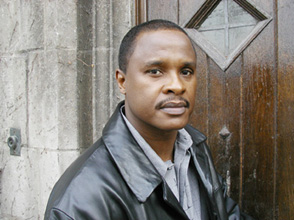Kenneth Adams

Kenneth Adams (Photo: Jennifer Linzer)
Kenneth Adams was convicted of a double murder he had nothing to do with
Kenneth Adams is one of the group of men known as the Ford Heights Four who were convicted of the 1978 abduction and murder of Lawrence Lionberg and Carol Schmal and the rape of Ms. Schmal. Adams and his codefendants became suspects in the case after Cook County Sheriff's Police received a tip from Charles McCraney, a man who lived near the murder scene. McCraney ultimately placed the defendants there at about the time the murders were believed to have occurred.
Paula Gray's coerced confession
Based on McCraney's claim, police questioned Paula Gray, a 17-year-old woman who was borderline mentally retarded. After being questioned over two nights in motels, she testified before a grand jury that she had been present when Adams and three other men — Verneal Jimerson, Willie Rainge, and Dennis Williams — repeatedly raped Ms. Schmal and then shot both victims to death. Her confession contained only two purported facts that were not known to the police, and both of those assertions ultimately were shown to have been false.
Gray soon recanted her statement and thereupon was charged both with the murders and with perjury. She was tried simultaneously with Adams, Rainge, and Williams in the same courtroom before the same judge, but by a separate jury. The charges against Jimerson could not be pursued at that time because without Gray's testimony there was no evidence against him. McCraney had not placed Jimerson at the scene.
Conviction despite recantation
The convictions of the remaining defendants rested primarily on McCraney's testimony and the testimony of an informant, David Jackson, who falsely claimed to have heard Williams and Rainge talking in jail about how they committed the crime. Forensic evidence — later shown to have been false in one regard and unreliable in another — also was presented by the prosecution. Adams was sentenced to 75 years, Rainge to life, Williams to death, and Gray to 50 years for the murders and 10 years, concurrently, for perjury.
After Rainge and Williams, but not Adams, won new trials in 1982 based on ineffective assistance of counsel, Gray agreed to testify against them and Jimerson in exchange for her release from prison. Jimerson was then charged, convicted, and sentenced to death.
Evolving testimony
Although McCraney originally had not placed Jimerson at the scene, he did so at the trial. Rainge and Williams then were retried and convicted based on the false testimony of Gray and McCraney. Rainge was sentenced to life without parole, Williams to death. Jimerson's conviction was reversed in 1995 based on prosecutorial misconduct; the prosecutors had failed to correct perjury by Gray, who had falsely stated that she had been promised nothing in exchange for her testimony.
Prosecutors agree to DNA
Now lacking credible evidence against Jimerson, the Cook County State's Attorney's Office agreed to DNA testing. Meanwhile, Northwestern University journalism students working under Professor David Protess found a police file showing that, within a week of the crime, a witness had told the Sheriff's Police they had arrested the wrong men. The witness said he knew who committed the crime because he heard shots, saw four men run away from the scene, and the next day saw them selling items taken from the robbery of the victims. As a result of police and prosecutorial misconduct, however, the report had not been turned over to the defense prior to trial as required by Brady v. Maryland, 373 US 83 (1963). One of the men identified by that witness was by then dead, but the other three ultimately confessed. Then the results of the DNA testing conclusively established the innocence of the Ford Heights Four and corroborated the confessions.
$36 million settlement
The Ford Heights Four then filed civil rights suits against the Cook County Sheriff's Police. Through the discovery process in that litigation, it became apparent that Gray's false confession had been coerced. The police misconduct prompted Cook County to settle the men's claims for $36 million, the largest such settlement in U.S. history. In 2001, Gray's conviction was thrown out. In 2008, Cook County settled a civil case brought on her behalf for $4 million.
— Rob Warden

